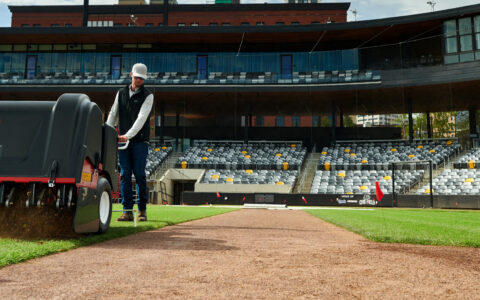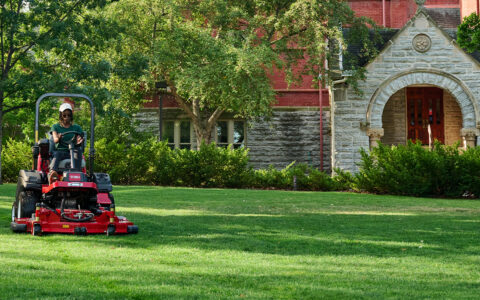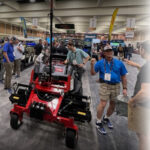Aeration is a great way to improve the health and appearance of turf. It’s an effective solution to alleviate compacted soil while also allowing water, air and nutrients to reach plant roots, where they can best be used to promote vigorous, resilient growth.
Two Common Forms Of Aeration
The two most common forms of aeration include coring and solid tine. Both types are instrumental in creating healthy, robust turf.
Core aeration removes plugs of soil, which are then reincorporated into the turf canopy or removed. There are numerous benefits of core aeration, including reducing soil compaction, rebalancing the soil mixture for optimal plant growth, and improving drainage and air exchange. This form of aeration is more aggressive and is therefore most effective when the plant is actively rooting.
Solid tine aeration produces a hole in the soil without removing any material. As with core aeration, solid tine aeration helps improve drainage and air exchange, allowing the turf to grow more efficiently. Since no cores are removed, there is virtually no clean up needed, and the turf to be used immediately after aerating. This form of aeration is less stressful to the plant and can be done throughout the growing season.
The best aeration strategy includes both coring and solid tine aeration. Coring is a great way to reduce thatch and maintain proper soil mixture for optimal growing conditions, and solid tine aeration is an effective solution to help improve water infiltration and air exchange without taking the turf out of play. A comprehensive aeration plan including both coring and solid tine will help build thick, resilient turf that not only is less susceptible to disease, but will also require less water and nutrients to thrive.
Toro Solutions
Aeration of sports fields, parks and municipal areas may be essential, but that doesn’t mean it has to be difficult. Toro® ProCore® 864 and1298 tractor-mounted aerators are highly efficient and productive. With the ProCore 864, you can aerate 1.5 acres per hour, and the ProCore 1298, featuring a coring width of 98 inches, lets you handle 2.3 acres per hour. They operate smoothly and easily, and they’re backed by Toro’s well-known reliability so you can count on dependable performance for years to come. To learn more, call your local Toro distributor or visit toro.com.

![ProCore_Aerators[1]](https://torogroundsforsuccess.com-content/uploads/2014/03/ProCore_Aerators1.jpg)










